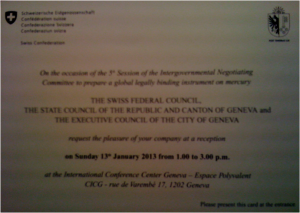by Philip Wolfe
Today marks the official start of INC5. Registration has been going on since Friday at 2:00pm, and yesterday was full of opportunities for bilateral and regional working group coordination meetings.
Morning: The first morning is of great importance for NGOs trying to get their messages out to decision-makers. We will be at the MIT Joint Program table to discuss our poster as delegates arrive. We also expect there to be some advocacy demonstrations. For instance, IPEN is sponsoring an event in the morning at the conference center called “Honoring Minamata”.
The schedule is quite broad, so we won’t have a good idea of how the meetings will progress until we actually get to breakout groups. To provide a sense of how broad the schedule currently is, here’s the provisional agenda:
1. Opening of the session.
2. Organizational matters.
a. Adoption of the agenda.
b. Organization of work.
3. Preparation of a global legally binding instrument on mercury.
4. Other matters.
5. Adoption of the report.
6. Closure of the session.
Agenda items 1 and 2 are the biggest part of the schedule for the morning, and while this seems like a brief formality, I assure you this is no small matter. At INC4, the first morning was dominated by opening ceremonies and country opening statements.
Lunch: the official host country reception will be held during lunch of the first day. Formal invitations were given out during registration. And yes, we were invited.

Contact groups will break out, possibly as early as the morning and, if energy and enthusiasm run high, they will work through the night streamlining text and showing signals of movements on difficult and interconnected issues.
Be sure to follow the progress on twitter @MITmercury. While we expect most of the #MITmercury team to be in plenary in the morning, look for Mark Staples and Danya Rumore to potentially follow contact group sessions on artisanal and small-scale mining (ASGM) or storage and waste in the afternoon and for Philip Wolfe and Amanda Giang to provide updates on the contentious issue of how to include health impacts in the final text.
